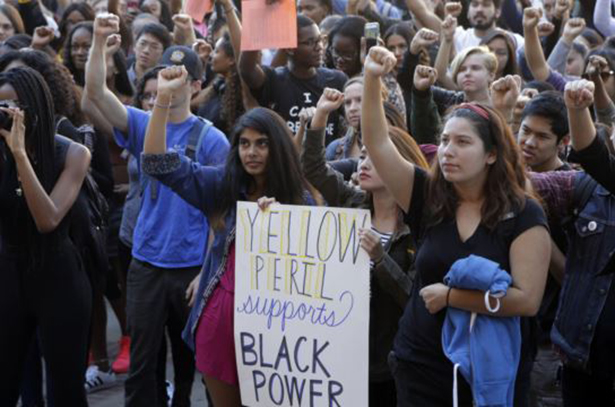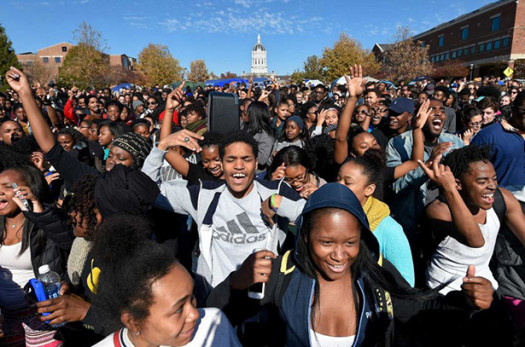
Last fall's student protests exposed how far afield university culture has strayed from its enlightened days as the center of free speech and scholarly inquiry.
In an in-depth piece entitled The New Dark Ages on Campus, K.C. Johnson details the many complaints of structural racism and actions of protesting students and groups designed to silence any dissenting voice. Protestors actively sought to disrupt and harass fellow students who did not join with them.
In mid-November, protestors at Dartmouth, organized by campus NAACP, stormed the library, as part of a "Blackout" demonstration. As they chanted, "F**k your white privilege" and "F**k your comfort," the protestors surrounded white students reading at desks and entered one private study carrel, obstructing the occupants' efforts to leave.
At Amherst College, students also staged a sit-in at the college library to "stand in solidarity with the students of Mizzou, Yale, South Africa, and every other institution across the world where black people are marginalized and threatened.”
The protestors’ chants and actions pale in comparison to their demands:
Protestors at California Polytechnic State University wanted the school to "institute mandatory Women's & Gender Studies or Ethnic Studies courses for students in every major."
The [University of] Missouri protestors not only sought to deny First Amendment rights to student journalists but also wanted students—not faculty or trustees—to receive final say over the course of study, through a "comprehensive racial awareness and inclusion curriculum throughout all campus departments and unites, mandatory for all students, faculty, staff and administration."
At the University of Virginia, the protestors argued that "every course … should strive to recognize minority perspectives." They even provided examples for recalcitrant faculty: "For example, Biology could study genetics across minority communities, or the ethical history of 'progress' in relation to eugenics; Systems Engineering could discuss culturally sensitive industrial organization; and Classics could review the writings and lives of ancient minority writers."
Those at Brown University wanted "cluster hires of junior faculty of color," focused on questions related to social justice.
At Dartmouth College, the call was for a "multi-million-dollar commitment coupled with hired positions focused on increasing numbers of faculty/staff of color (i.e. Asian, Black, Latin@, and Native faculty/staff)."
The Michigan State demands were even more precise: "an increase in tenure-stream faculty whose research specializes in Black Politics, Black Linguistics, Black Sociology, Black Psychology, African politics, Black Queer Studies, Hip-Hop Studies, African American Literature, African Literature, and Decolonial Theory. All these faculty hires must be approved by a panel of Black student leaders and will be tenured in the Department of African American and African Studies."
Intolerance of opposing viewpoints and others' First Amendment rights has been steadily growing on campuses in recent years. "What's shocking is that free speech … is an evil to be purged," observed former ACLU national board member Wendy Kaminer. "The I'm not in favor of censorship, but mantra that reigned a decade ago has been replaced with I'm strongly in favor of censorship, and."

Yet even as they earned scorn off-campus, protestors won many concessions and appeasements on campus, among them:
- University of Missouri President Tim Wolfe resigned as demanded.
- Yale president Peter Salovey announced the university would devote $50 million for various diversity initiatives.
- Duke University effectively implemented protestors' diversity plan.
Quoting Justice Louis Brandeis’s famous statement, "sunlight is said to be the best disinfectant," Johnson concludes:
With little likelihood of reform from within the academy, sunlight remains all the more important. Trustees need to exercise a more rigorous oversight role regarding campus affairs; so too does the media. And parents need to closely examine precisely what kind of institution to which they are sending tens or hundreds of thousands of dollars in tuition.
In this respect, there is a potentially encouraging sign: Enrollment at the 2016-17 academic year to the school that originated the fall protest wave, the University of Missouri, has dropped by about 1,500 students, producing a $32 million budget gap. If a moral argument for upholding civil liberties cannot persuade college and university leaders, perhaps a concern with declining tuition revenue will.
The tag-team efforts of radical students, their professors, and administrators to snuff out elementary rights and elementary rules of civility and fairness have already stunted the academic and scholarly life of this nation. And they will retard the intellectual advancement of the United States and impoverish the life of the mind in this country for generations to come.

